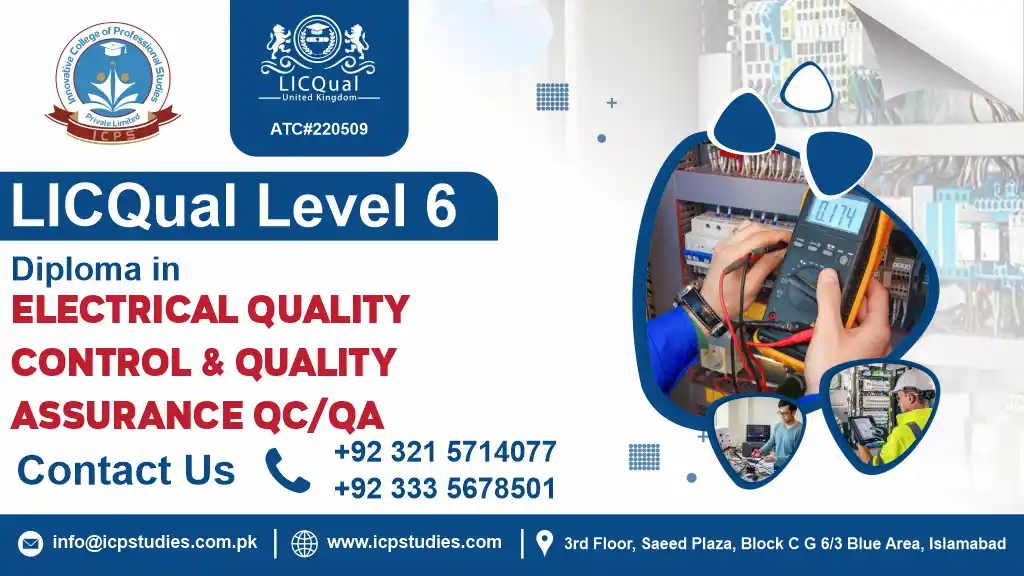The LICQual Level 6 Diploma in Electrical Quality Control and Quality Assurance (QC/QA) is an advanced qualification designed for professionals seeking to specialize in quality control and assurance within the electrical industry. This diploma equips learners with the advanced skills and knowledge needed to maintain and enhance the quality of electrical systems, installations, and projects through rigorous testing, inspections, and compliance with industry standards.
The LICQual Level 6 Diploma offers a comprehensive approach to electrical quality control and assurance. It covers essential aspects such as inspection techniques, testing methodologies, risk management, and the implementation of quality standards within electrical systems. Learners will explore topics including advanced quality management systems (QMS), international electrical codes, standards like ISO 9001, and the practical application of QA/QC procedures within the electrical engineering field.
The LICQual Level 6 Diploma in Electrical Quality Control and Quality Assurance (QC/QA) is an essential qualification for electrical professionals looking to enhance their careers in quality management. Whether you’re aiming for a leadership role, looking to expand your knowledge of electrical quality systems, or striving to ensure compliance with industry standards, this diploma will equip you with the skills necessary to excel in today’s competitive market.
Enroll today and take the next step in your career with advanced skills in electrical quality assurance, risk management, and continuous improvement.
All About LICQual level 6 Diploma in Electrical Quality Control and Quality Assurance QC QA
Course Overview
The LICQual Level 6 Diploma in Electrical Quality Control and Quality Assurance (QC/QA) is an advanced qualification designed for professionals in the electrical industry who want to specialize in the quality control and assurance of electrical systems, installations, and projects. This course provides an in-depth understanding of the principles, techniques, and industry standards required to ensure that electrical projects meet rigorous quality standards.
In today’s rapidly evolving electrical engineering field, ensuring the safety, efficiency, and reliability of systems is essential. This diploma will equip learners with the expertise to implement advanced quality assurance protocols, conduct thorough inspections, and maintain compliance with national and international electrical standards.
Through a combination of theoretical learning and practical application, students will explore topics such as electrical quality management systems, risk mitigation strategies, advanced testing and inspection methods, and leadership in quality assurance processes. Upon completion, learners will be well-prepared to take on leadership roles in quality control, manage electrical projects efficiently, and ensure high standards of quality in every aspect of their work.
This qualification is ideal for those looking to further their careers in electrical quality management, and those seeking to be at the forefront of ensuring safety, performance, and reliability in electrical systems and installations.
Study Units
- Unit 1: Advanced Quality Management Systems in Electrical Engineering
Unit 2: International Standards and Regulatory Compliance for Electrical Systems
Unit 3: Electrical Testing, Inspection, and Performance Evaluation
Unit 4: Risk Management and Safety in Electrical Quality Control
Unit 5: Root Cause Analysis (RCA) and Corrective Actions in Electrical Systems
Unit 6: Performance Monitoring and Continuous Improvement in Electrical Systems
To enroll in the LICQual Level 6 Diploma in Electrical Quality Control and Quality Assurance, candidates should meet the following entry requirements:
- Relevant Professional Background:
- Applicants should have a foundational understanding of electrical engineering, typically acquired through previous studies or hands-on experience in electrical installations, maintenance, or similar fields.
- A relevant Level 3 or Level 4 qualification in electrical engineering or a related discipline is highly recommended.
- Experience in the Electrical Industry:
- Practical experience in electrical systems, installations, or quality management is beneficial, as it will allow learners to fully engage with the advanced concepts covered in the course.
- Basic English and Mathematical Skills:
- A good grasp of English, both written and verbal, is essential for understanding the course material, completing assignments, and engaging in discussions.
- Basic mathematical skills, particularly in areas such as measurements, statistics, and calculations for testing and inspections, are also recommended.
- Commitment to Professional Development:
- A strong desire to advance in the electrical industry, particularly in the areas of quality control, assurance, and project management.
- Interview/Assessment (if applicable):
- Some candidates may be asked to attend an interview or complete an initial assessment to ensure their suitability for the course, especially if their previous qualifications or experience do not directly align with the requirements.
These entry requirements ensure that learners have the necessary foundation and readiness to benefit from the advanced concepts covered in the LICQual Level 6 Diploma in Electrical Quality Control and Quality Assurance.
The LICQual Level 6 Diploma in Electrical Quality Control and Quality Assurance (QC/QA) is ideal for a variety of professionals in the electrical and engineering sectors who are looking to enhance their skills and advance their careers in quality management. This course is tailored for:
- Electrical Engineers and Technicians:
- Professionals working in electrical engineering who wish to specialize in quality control and assurance to enhance their ability to manage quality systems and ensure compliance with industry standards.
- Quality Assurance and Quality Control Managers:
- Individuals responsible for overseeing quality assurance processes and ensuring that electrical projects meet required standards, looking to gain advanced expertise in quality management.
- Project Managers in Electrical Engineering:
- Project managers who are keen to integrate quality assurance practices into their projects and learn how to lead teams while ensuring the highest standards of quality throughout the project lifecycle.
- Electrical Inspectors and Auditors:
- Professionals involved in inspecting and auditing electrical systems who wish to expand their knowledge of advanced inspection techniques and compliance with international electrical standards.
- Aspiring Leaders in Electrical Quality Assurance:
- Individuals looking to move into senior leadership roles, where they will be responsible for driving quality assurance initiatives and leading teams in ensuring electrical system safety, performance, and compliance.
- Electrical Contractors and Consultants:
- Contractors and consultants who want to integrate quality assurance processes into their electrical projects and enhance their credibility by ensuring that projects meet rigorous quality standards.
- Technical Specialists:
- Individuals working in specialized electrical fields, such as renewable energy or advanced electrical systems, who need to understand the intricacies of quality control and assurance within their area of expertise.
This course is designed for professionals looking to develop a high level of expertise in electrical quality control and assurance, equipping them with the tools and techniques to excel in managing quality processes, ensuring compliance, and leading successful electrical projects.
Learning Outcomes
Unit 1: Advanced Quality Management Systems in Electrical Engineering
- Grasp the core principles and components of advanced Quality Management Systems (QMS) in electrical engineering.
- Evaluate how QMS supports compliance with industry standards and regulations.
- Design and implement quality control measures to enhance the performance and reliability of electrical engineering projects.
- Assess the effectiveness of various QMS frameworks (e.g., ISO 9001) in the electrical engineering context.
- Apply relevant tools and techniques to monitor and improve quality standards in electrical systems and processes.
Unit 2: International Standards and Regulatory Compliance for Electrical Systems
- Understand the international standards governing electrical systems (e.g., IEC, ISO) and their global impact.
- Analyze regulatory requirements for electrical systems across different regions and industries.
- Demonstrate knowledge of compliance processes for electrical systems in line with national and international standards.
- Evaluate the consequences of non-compliance on safety, performance, and operational efficiency.
- Apply regulatory guidelines to ensure that electrical systems meet safety, environmental, and technical standards.
Unit 3: Electrical Testing, Inspection, and Performance Evaluation
- Understand the key principles of electrical testing and inspection methods for systems and components.
- Apply various testing methods (e.g., functional, performance, and diagnostic testing) to assess electrical systems.
- Analyze test results to evaluate the performance of electrical systems in accordance with international standards.
- Implement suitable inspection techniques to ensure safety, quality, and reliability in electrical systems.
- Identify performance issues in electrical systems through systematic testing and propose solutions for improvement.
Unit 4: Risk Management and Safety in Electrical Quality Control
- Understand the principles of risk management in electrical systems, including hazard identification and risk assessment.
- Analyze potential safety risks within electrical systems and recommend effective mitigation strategies.
- Apply risk management frameworks (e.g., FMEA, Fault Tree Analysis) to assess safety and quality in electrical engineering projects.
- Evaluate the effectiveness of safety protocols and standards in managing risks in electrical systems.
- Implement safety measures to reduce risks and improve safety outcomes in electrical quality control processes.
Unit 5: Root Cause Analysis (RCA) and Corrective Actions in Electrical Systems
- Understand the methodology of Root Cause Analysis (RCA) in electrical systems.
- Apply various RCA techniques (e.g., Fishbone Diagram, 5 Whys) to identify underlying causes of electrical system failures or inefficiencies.
- Evaluate the impact of root causes on system performance and safety.
- Design corrective actions based on RCA findings to address electrical system issues and prevent recurrence.
- Monitor the implementation of corrective actions to ensure continuous improvement in electrical systems.
Unit 6: Performance Monitoring and Continuous Improvement in Electrical Systems
- Understand the principles of performance monitoring and continuous improvement for electrical systems.
- Apply performance metrics and indicators to assess the efficiency and effectiveness of electrical systems.
- Evaluate the use of monitoring tools and techniques (e.g., SCADA, data logging) to track system performance.
- Design strategies for continuous improvement to optimize electrical system performance.
- Assess the impact of continuous improvement initiatives on system reliability, efficiency, and sustainability.
FAQs about LICQual level 6 Diploma in Electrical Quality Control and Quality Assurance QC QA







